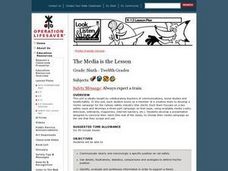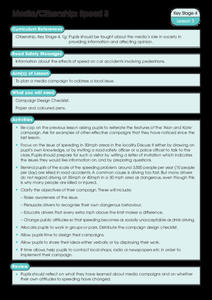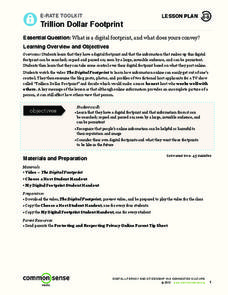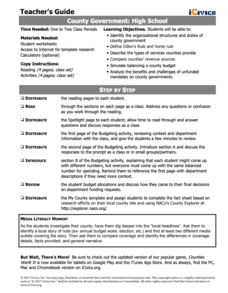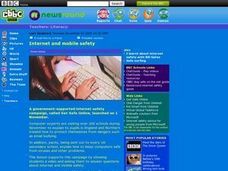Social Media Toolbox
Social Media Education
Show what you know about social media! The 16th and final lesson plan in The Social Media Toolbox gives pupils the opportunity to share their social media experiences with their school communities. Groups identify the most important...
Facebook
Social Media and Sharing
Whether it's cute cat videos or pictures from an epic vacation, scholars love to check out what's happening on social media! But, how much sharing is too much? A lesson from a vast digital citizenship series poses some serious points to...
Facebook
Online Presence
What happens when an online post gets the wrong kind of attention? Learners evaluate the good, the bad, and the occasionally ugly side of social media posting with a instructional activity from a vast digital citizenship series. After...
Facebook
Different Perspectives
What do people's social media profiles say about them? Explore diverse perspectives and digital citizenship in an activity designed with self-identity in mind. Pupils reflect on their own profiles, then collaborate to examine...
Facebook
Who Do You Want to Be?
Can posting art or music online lead to the career of your dreams? Inquisitive individuals consider their social media presence with a lesson from a series focusing on identity exploration and digital citizenship. Pairs put their heads...
Curated OER
The Media is the Lesson
Students work as a member of a creative team and develop a media campaign for a client.
Curated Video
Safety Mode
Teach your YouTube users how to protect themselves from offensive content with a mini lesson on Safety Mode. The teacher presents information about Safety Mode, and then demonstrates how it can be turned on and off. Learners...
Facebook
Privacy and You
The stuff I share goes where? Social media scholars discover how sites collect and use metadata during a lesson about privacy and reputation. The activity demonstrates smart privacy settings and promotes good digital citizenship.
Social Media Toolbox
Ethical Decision Making
When faced with a dilemma, how do journalists decide how much news to use? Social media scholars explore the philosophies of ethical resolution in the first of a 16-part Social Media Toolbox series. Partnered pupils use a Potter Box to...
Social Media Toolbox
Cyberbullying
What can we do to make our school community more aware of cyberbullying? From The Social Media Toolbox, lesson 10 of 16 takes on the tough topic of bullying. Learners research cyberbullying through online research, then create an...
Common Sense Media
Cyberbullying: Crossing the Line
Teach pupils to identify different forms of cyberbullying, including harassment, deception, “flaming,” and threats to safety, as well as how to handle a situation in which cyberbullying might be involved.
Curated OER
Media/Citizenship: Speed 3
Students examine data about the effects of speed in car accidents. They create their own media campaign about safety while driving. They share their ideas with the class.
Common Sense Media
Talking Safely Online
What is the difference between online and real-life friendships? Pupils learn how to keep information private online and maintain their safety in various situations requiring online communication.
Common Sense Media
Which Me Should I Be?
Impress upon learners the importance of considering how we identify ourselves online, and how this relates to overall considerations of safety and digital wellness.
Curated OER
Safe In the City
Students read a news article about the most dangerous cities in the United States. In groups, they develop a plan to present to the city council to improve the situation in their own community. They examine how the media presents the...
Curated OER
Communication, Day 3: Asking What You Want
Mild to moderately disabled secondary students practice asking for what they want. They discuss a scenario, list things they want, then practice asking for those things. Our special needs students need to know how to communicate...
Common Sense Media
Trillion Dollar Footprint
Learners explore their digital footprints, and discover how information they put online can easily be searched, copied, forwarded, and seen by a large audience.
Curated OER
Private & Public
Some disabled students have a difficulty understanding what is and what is not publicly appropriate behavior. Help them build healthy social skills by defining public and private behaviors, labeling public and private places, and...
Anti-Defamation League
Building a Foundation for Safe and Kind Online Communication
Put a spotlight on internet safety with a lesson designed to boost positive online communication. Scholars listen to the story, Yettele's Feathers by Joan Rothenberg, and answer questions. An emoji-themed handout challenges pupils...
Curated OER
Exploitation, Day 1: Touching
Developmentally Disabled students need to know they types of touch, appropriate touching, and their personal rights. They brainstorm types of touch, go over their personal rights, and discuss social skills. Very appropriate lesson for...
iCivics
County Government: High School
Balancing a budget—the bane of many people's existence! Yet, its' something that must be done, especially in government systems. The resource, fourth in a seven-part series exploring local government, focuses on various exercises that...
Curated OER
Food Safety-Consumers Need the Facts
Students begin by completing a survey asking them to rank their concerns about commercially prepared foods. They develop a definition of relative risk, and complete the "Pro or Con" worksheet. Students work in groups to make a study of...
Curated OER
Cyber Safety Fair: The Dark Side
Students contribute research projects to a cyber safety fair. In this Internet safety lesson, students assemble information regarding safety on the Internet. Students present safety guidelines as they create PowerPoints or board displays...
Curated OER
Internet and Mobile Safety
Students watch a video and ask questions about internet usage and mobile safety. Students chart out scales on why young people chat to others on the internet and on mobiles. Students determine the main difficulties that young people...





